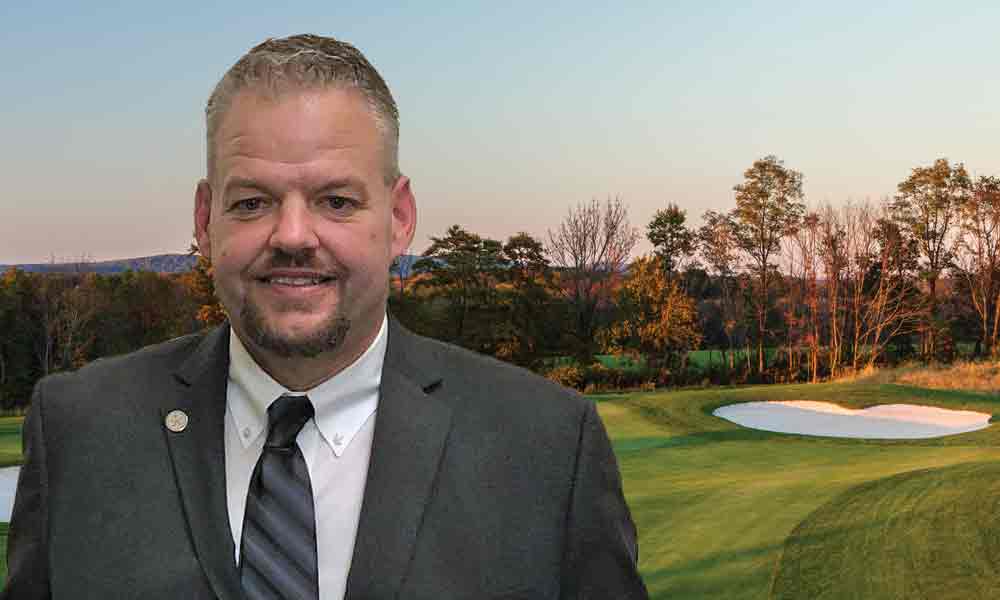18 Years Experience KemperSports: Jason Pierce Golf Course Superintendent


You may not know the name KemperSports, but you definitely know many of the KemperSports golf courses, golf resorts, athletic clubs and lodges located across the U.S., Mexico and the Caribbean. As builder, owner, manager or all of the above, this family-owned-and-operated business launched in 1978, now has 130 facilities, including Chambers Bay, Desert Willow Golf Resort, Sand Valley Golf Resort, Harbor Shores, Streamsong Resort and Bandon Dunes, the course recognized as “No. 1 Golf Resort in North America” by both Golf Digest and GOLF magazine.
Some of the KemperSports properties are resort courses, some are daily fee facilities, many are municipal daily fee courses, a few are private or semi-private clubs, and a handful are athletic or conference centers. Across the board, these golf properties account for 7,000 jobs and nearly two and a half million rounds of golf played in 2017 alone. In fact, this company’s role in growing the game of golf is so significant that more than half of all the new U.S. golf course openings last year involved KemperSports.
From customer service training to community involvement to culinary excellence, KemperSports overlooks no detail at its facilities. The company also has established and maintains a proprietary Green to a Tee™ program, purposefully designed to foster environmentally-focused initiatives at its golf facilities. The program addresses golf course maintenance practices, habitat management, water conservation, energy usage, recycling, green vendor utilization and staff education and training.
With so many exemplary golf courses and outstanding superintendents, the competition to be recognized as the best of the best at KemperSports is always tough. Understandably, Jason Pierce, superintendent at the Heron Glen Golf Course in Ringoes, New Jersey, was proud to be recognized as the KemperSports 2017 Superintendent of the Year.
Making the recognit ion doubly sweet was the fact that Heron Glen also earned the 2017 KemperSports Green to a Tee Facility of the Year award, achieving status as one of only three golf courses in the U.S. to attain the distinction of Green to a Tee III. Among the numerous initiatives that helped Jason and Heron Glen earn this much-deserved recognition are changes Jason facilitated to attract or nurture both honeybees and monarch butterflies.
Built on the rolling hills where Revolutionary War patriots once battled British soldiers, the 18-hole Heron Glen Golf Course opened in 2002. Since that time, this public-play golf facility has grown its reputation as an exceptional place to enjoy golf and the great outdoors. The course, owned by Hunterdon County and managed by KemperSports, includes a practice facility with both grass and mat hitting areas, a large putting green and practice bunker, a full service proshop, restaurant and a PGA Professional teaching staff for both individual and group lessons. Each year the course sees approximately 40,000 rounds of play including 3,000 outing rounds.
Jason and his crew, which seasonally ranges between 7 and 14 workers, strive to maintain first-rate playing conditions, although they are working with municipal course resources. “We are challenged to do more with less,” said Jason, “and we take pride in maintaining quality course conditions and being able to compete on a higher level.”
Clearly, what they are doing is working, for Heron Glen Golf Course continues to rack up awards and honors, including ranking No. 11 in Golfweek’s 2018 “Best Courses You Can Play New Jersey” along with a bevy of honors from Golf Advisor, Golf Magazine, Golf.com and other top industry publications.
Environmental Stewardship
Jason, like most golf course superintendents, embraces his role as an environmental steward. In 2012, Heron Glen earned certification both by Audubon International as an Audubon Cooperative Sanctuary Program Member Course and by the New Jersey Water Supply Authority and Raritan Headwaters Association as a River-Friendly Golf Course.
Under Jason’s leadership, Heron Glen has reduced its algaecide usage in the ponds by 30 percent, increased native habitat areas by more than five acres, added bird boxes, constructed a bioswale to minimize nonpoint source pollution in the maintenance area and changed to a 20-foot buffer around 100 percent of ponds to help prevent nutrient loading.
Jason believes he has learned one of his greatest lessons as a superintendent in facing the unique challenge of water restrictions at Heron Glen. Over the years, he has reduced water usage by as much as half. The facility’s water allocation is tied to the cubic feet per second flow of a small stream.
“Our restrictions are stringent, but these strict guidelines have given me the opportunity to challenge the course when it is dryer. I’ve come to realize,” Jason added, “how much people create their own problems with overwatering. Restricting water isn’t nearly as detrimental as overwatering. Dormant grass comes back a heck of a lot better than diseased grass that is caused by overwatering.”
We Want the Community to Know We are Listening
Despite all the environmentally responsible actions Jason has taken, it wasn’t until one of the course’s frequent golfers brought up the subject of monarch butterflies that Jason realized he could be doing even more. The golfer said that his wife, a local larvae counter, was not happy with the golf course mowing schedule. As Jason explained, “I didn’t even know there were monarch larvae counters, but what matters to the people in our community matters to us. Besides, if there is more I can be doing environmentally, I want to be doing it.”
The larvae counter had noticed Jason mowing a ravine, which he did to increase streambank stabilization and help protect New Jersey’s waterways. She asked him to change his mowing schedule to accommodate the monarch butterfly larvae feeding on the native milkweed plants. Milkweed plants are the preferred place for monarchs to lay their eggs and almost exclusively, the only food source for baby monarch caterpillars.
By adjusting the mowing schedule and saving stands of milkweed plants, the crew at Heron Glen have not only nurtured one of the most loved and recognized butterflies in North America, but also, they have demonstrated how they are eager to interact with and respond to the community.
Another of the course’s frequent golfers enlisted Jason’s support in sheltering honeybees at Heron Glen. The golfer, a part time beekeeper, was interested in housing bees at the course. Jason, as always, was eager to get involved.
After selecting a suitable area with plenty of annual flowers, the beekeeper brought in approximately a half dozen bee boxes. The bees thrived without challenges in their first season at the course and proved to be a source of interest to many Heron Glen golfers and residents in the area. Unfortunately, in the second year, an unseasonable February weather spike and balmy 70-plus degree temperatures rousted the bees from their winter dormancy. Becoming active, many of the bees began to leave the hive only to be caught in frigid air when the temperature suddenly plummeted later in the day. Although some fifty percent of the bee colony was lost, and the beekeeper has temporarily removed the hives, Heron Glen is committed to restarting and supporting its bee initiative.
“I love it when people engage with us about their interests or concerns,” said Jason. “We are a high-traffic public golf course. The people who play here have all kinds of interests, and we are accountable not only to provide quality golfing conditions, but also to demonstrate to them that we are committed to safeguarding their community’s environment. It’s the right thing to do, and it’s the only way KemperSports wants it done.”
Find out more about KemperSports at kempersports.com.
Linda Parker has been writing professionally since the 1980s. With clients in finance, sports, technology, change enablement, resorts and nonprofit global initiatives, Linda helps organizations communicate their stories in meaningful ways to the people they most want to reach. She has authored, ghostwritten or contributed to more than a dozen nonfiction books. Linda is a member of the Authors Guild and the Golf Writers Association of America. You can connect with her at Linda@GlindaCreative.com
Recent Posts
The Rare Condor: What It Means for Golf and the Course Maintenance Behind It
Imagine this: you're on a par-5, having just hit your second shot toward the green.…
DENIOS Under Bench Cabinet Provides Safe Storage of Lithium-Ion Batteries
DENIOS introduces asecos under bench cabinets for the safe storage of undamaged lithium-ion batteries. They…
True Blue Golf Club, One of America’s Top 100 Resort Courses, Acquires Steve Dresser Golf Academy
True Blue Golf Club has acquired the Steve Dresser Golf Academy, a renowned instructional facility…
Memphis Country Club: A Golfer’s Study in Precision and Tradition
If you have ever teed it up at Memphis Country Club, you know this isn’t…
Superintendents Online Turf Directory – EVERYTHING TURF
Our online directory, directory.GolfCourseTrades.com is the go-to resource for the busy superintendent. It is your opportunity…
Foley Company attains GCSAA Silver Partner Status
Foley Company, a leader in turf equipment innovation and technology, affirms its support of the…

